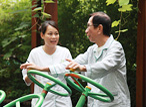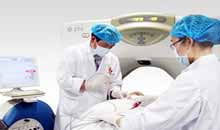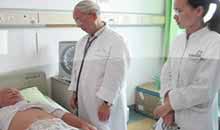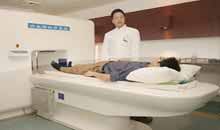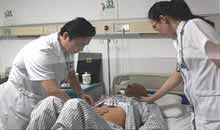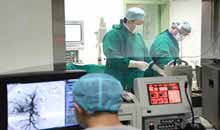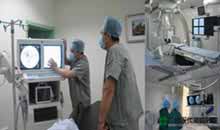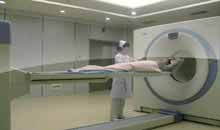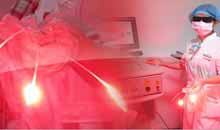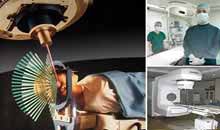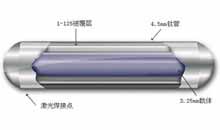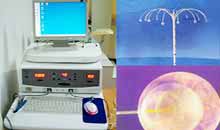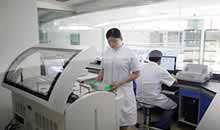- Basic
- Symptoms
- Diagnosis
- Treatments
What is Testicular Cancer?
Testicular cancer is malignant cancer that starts in the testicular tissues and caused by the cancerization of testicular cells. It is mainly divided into two types, namely, seminomas and non-seminomas.
Incidence and Survival Rate of Testicular Cancer
Testicular cancer is clinically rare and only accounts for 2 percent of all male malignant cancers. Its risk group is from 20 to 40 years old. Clinical treatment effect of testicular cancer is evident, with which 5-year survival rate can reach 95%, even higher.
Causes of Testicular Cancer
1. Dietary habit: long-term intake of foods grew or fed with hormonal materials.
2. Characteristic factors: study has proved that people who are introverted and long-term depressive have high risk of testicular cancer.
3. Environment factors: air pollution, machinery radiation (such as computer, induction cooker, microwave, cell phone), noise, and so on.
4. Hereditary factors: study proved that hereditary factors are related to testicular cancer.
Risks of Testicular Cancer
1. Testicular cancer can cause dead sperms or no sperm, thus the patient loses fertility ability. More over, the inflammatory virus from the patient can probably infect the patient’s partner, causing gynecological disease.
2. Testicular cancer can cause sperm loss, kidney deficiency, vigor consumption, back pain and early aging.
3. Testicular cancer can also cause sexual function decline, or even sexual dysfunction.
Postoperative Care for Testicular Cancer
1. Dietary care
Testicular cancer patients should take in more foods high in calories, protein and vitamin, and avoid smoking, drinking and stimulating foods.
2. Mental care
Help the patient establish a steady believe to face disease and fight against cancer, help them get rid off depression, pay attention to their mental activities, care about them and listen to them.
3. Life care
Pay attention to the nursing of the patients’ skin, clean their skin with warm water daily, help them roll over regularly, and massage their arms and legs.
4. Pay attention to the environment
Keep the room clean, quite and full of fresh air, and maintain proper temperature and humidity.
Testicular cancer occurs in the testicular tissue and its pathological source is complex, but it is relatively rare in clinic, accounting for about 1% of all male malignancies. Testicular cancer is mainly common in the young men aged 15 to 39, while the curative rate of testicular cancer is relatively high.
Early detection and positive treatment is the key. Therefore, young men should enhance awareness of disease prevention. Once found the following special signs, you should promptly go to regular hospital for check.

What are the Symptoms of Testicular Cancer?
1. Enlargement of Testicle: This results from the interminably growth of tumor cells. The shape of enlargement is not uniform, sometimes very irregular, while the testicle growing with tumor will be markedly enlarged.
2. Hardened testicle: testicle is as hard as stone by touching, which is very different from general testicular inflammation that is uniformly swelling and soft by touching. Although testicle is very hard, but there is no pain when touched, which is also a difference between testicular inflammations.
3. Heavy sense of testicle: since testicular tumor is formed by the growth of numerous tumor cells, so it is a solid mass. With growing, the weight of testicle will increase, thus the patient will have a sense of falling and even it will affect walking. Lift the testicle with hand and a sense of holding a stone can be felt.
4. Transillumination test negative: Generally when hydrocele appears transparency of scrotum and testicle will increase, thus transmittance test will be positive. While testicular tumors grow densely and solidly, no liquid at all, so the transillumination test will be negative.
Experts from Modern Cancer Hospital Guangzhou remind you: When the above symptoms occur to you, you should go to check and get treatment immediately, so as not to delay the condition.
Testicular cancer is seriously threaten to men's health, the harm of which is mainly embodied in male's infertility. The key of testicular cancer treatment is to live up to early detection and early treatment. Early treatment has a certain good effect on the rehabilitation of patients while it will become very difficult to be treated once the cancer develop into advanced stage. Understanding the diagnostic methods of testicular cancer will contribute to the treatment to a great extent.

What are the diagnoses of testicular cancer?
1、Laboratory diagnoses: Laboratory diagnoses mainly contain the test of β -HCG, AFP and LDH serum, and these serum tumor markers have important significance to the treatment, follow-up and prognosis of testicular cancer.
2、Imaging diagnosis: As the most preferred diagnostic method clinically, type B ultrasound can help to identify the mass in the scrotum. Abdominal and pelvic CT is applied to confirm lymph node metastasis, while chest radiograph and CT is used to judge lung metastasis. Therefore, abdominal and pelvic CT is an important basis for the staging of testicular cancer patients. In the follow-ups of testicular cancer patients, positron emission tomography ( PET ) has a very high sensitivity and specificity on the evaluation of residual cancer cells.
3、Pathologic diagnosis: Biopsy may be a definitive diagnosis to testicular tumor, but there is certain risk of implanted metastasis. Thus, scrotal testis puncture biopsy should be applied with caution.
In addition, differential diagnosis is also one of testicular cancer diagnoses which includes the diagnosis of testicular epidermoid or dermoid cyst, testicular torsion, epididymitis, epididymo orchitis, and hydrocele.
Experts from Modern Cancer Hospital Guangzhou remind that if one is diagnosed with testicular cancer after related examinations, he should go to regular hospitals for treatment promptly.
Testicular cancer is mainly divided into two types: seminomas and non seminomas. About 30 out of every 100 testicular cancers (30%) are seminomas. Non seminomas include Choriocarcinoma, embryonal carcinoma, teratoma and yolk sac tumor.

Although ways of growth and spread for seminomas and non seminomas are similar, their treatment options will be different. However, if the tumors mix with seminomas and non seminomas, the treatment will be the same with treatment for non seminomas. Treatment options include staging of cancer, the patient's age and overall health condition, and many other factors.
Treatments for testicular cancer include surgery, radiotherapy, chemotherapy, traditional Chinese medicine and cellular immune therapy, etc.
1. Surgery
Surgery is a method to remove a part of testicle. Usually the patients who receive this treatment will concern about its influence on his sex function and reproductive capacity, but these worries can be alleviated, because as long as there is one healthy testicle, the patients can have normal erection and produce sperms.
2. Radiotherapy
Radiotherapy is a method to use high-energy rays to kill cancer cells so as to shrink the tumor, which generally is used after the surgery. It is a local therapy which can influence the cancer cells in the treatment site. Besides, spermatogenous cells are very sensitive to rays while the non spermatogenous cells not, so radiotherapy usually does not be applied to patients with non seminomas.
3. Chemotherapy
Chemotherapy is a constitutional treatment, which kills cancer cells of whole body by using anticancer medication. Chemotherapy is usually applied after surgery, so as to kill the residual cancer cells and improve the effects o surgery.
4. Traditional Chinese medicine
Traditional Chinese medicine can regulate balance of body, strengthening resistance to fight against cancer. It can effectively relieve the side reaction and complication after surgery. When chemotherapy and radiotherapy are undergone, traditional Chinese medicine can be also used to detoxify and enhance effects. As for advanced patients, after surgery, chemotherapy, radiotherapy, they can continuously take Chinese medicine to regulate condition, improve immunity. For the advanced patients who are not applicable to surgery, Chinese medicines can relieve symptoms, improve quality of life, and prolong life expectancy.
If you have any questions, please contact us via online consultation, email or phone call. If you find our website useful, please follow our FaceBook and YouTube, health information will be updated regularly.


